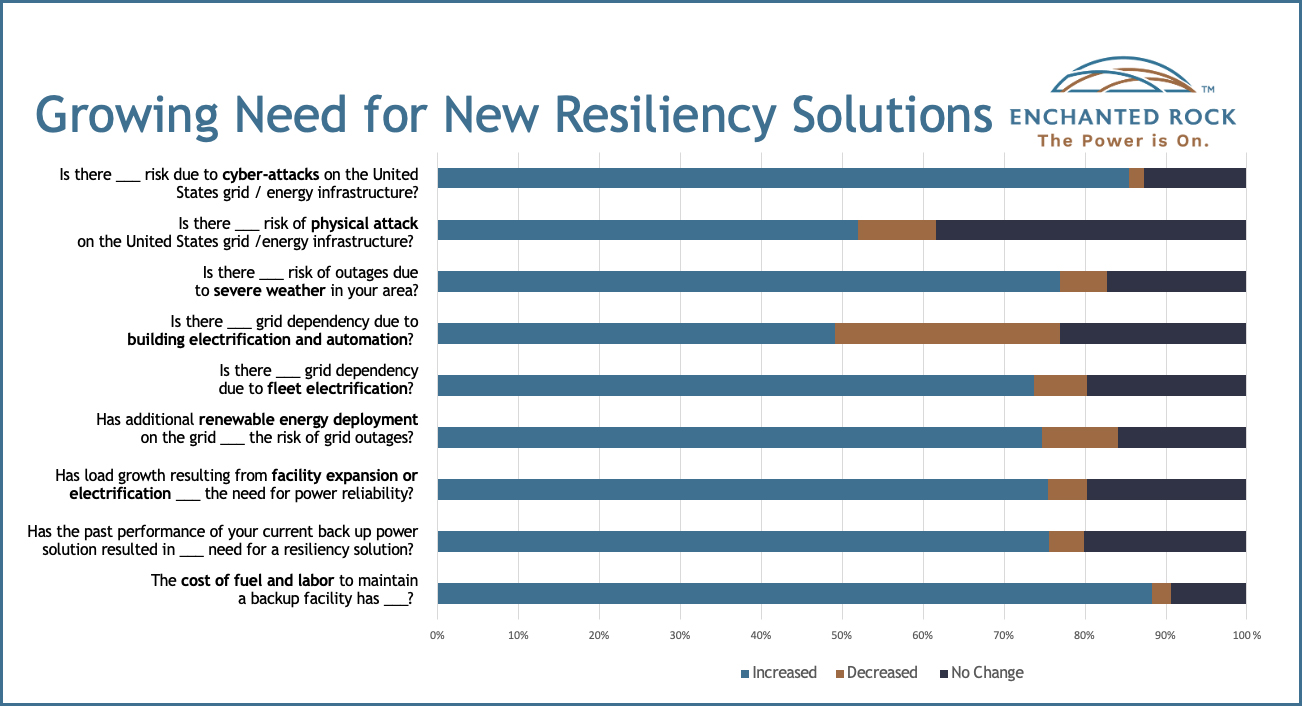 The business landscape in our highly connected world is evolving, and more and more companies need continuous and reliable power to run their operations to stay competitive. To learn more about their changing needs and concerns about power reliability, we recently surveyed over 200 organizations who are either considering implementing backup power strategies or already have power resiliency solutions in place.
The business landscape in our highly connected world is evolving, and more and more companies need continuous and reliable power to run their operations to stay competitive. To learn more about their changing needs and concerns about power reliability, we recently surveyed over 200 organizations who are either considering implementing backup power strategies or already have power resiliency solutions in place.
The results showed that there are a growing list of factors contributing to the need for power resiliency. We also confirmed that companies believe that their diesel generators have become increasingly unfit for their growing power needs, not to mention expensive to supply and maintain, and are looking for new solutions that make more sense for their business.
Grid disruptions
Companies are concerned about the increased risk of grid outages due to weather, physical attacks, and cyber attacks. When asked about the risk of outages due to severe weather in their area, 75% of companies responded that they feel that the risk in their area has increased. From more frequent heat waves, crippling cold snaps, and powerful storms, climate change is placing unprecedented strain on the grid, and companies are taking notice.
Additionally, 88% of survey respondents said they feel there is an increased risk due to cyber-attacks on the energy grid, and 76% believe there is an increased risk due to physical attacks on grid infrastructure, such as gunfire, intrusion and vandalism. The majority of respondents were correct – physical attacks on the U.S. power grid rose 71% last year compared with 2021 and will likely increase again in 2023, according to an analysis authored by the Electricity Information Sharing and Analysis Center (E-ISAC).
Load growth and increasing electrification or automation
The declining reliability of the grid comes at a critical time when companies are increasingly electrifying and automating their operations – making them more dependent on the grid for operations. Power outages can cause immense disruption for a business that relies on EV fleets or robotics and autonomous machines. In fact, 77% of survey respondents noted that load growth resulting from facility expansion or electrification has increased the need for power reliability. Companies are increasingly concerned that the grid will not be dependable enough to meet their evolving business needs and therefore are seeking out power resiliency solutions, to ensure their operations are not disrupted.
Backup power limitations
There is, however, apprehension about current backup power options like diesel generators. Aside from its inherent shortcomings, including noise, harmful pollutants, and fuel supply constraints, diesel is also becoming less of a cost effective option. 85% of companies who responded to the survey said that the cost of fuel and labor to maintain a diesel backup power generator has significantly increased. Diesel has long been a part of electrical resiliency strategies, but it’s clear that companies are now seeking alternative solutions that are cleaner, more cost effective and require less maintenance, while having the highest level of reliability.
Reliable, cost effective solutions
For companies concerned about the dependability of the grid in the face of more frequent disruptions and growing reliance on electrified operations, companies are seeking out microgrids and resiliency-as-a-service as cost effective solutions that not only ensure power reliability, but also support their sustainability goals. For example, Enchanted Rock’s dual-purpose microgrids use natural gas and renewable natural gas (RNG), which produce significantly lower air pollutants and carbon emissions than traditional diesel generators and can even achieve net-zero emissions. By choosing a resiliency-as-a-service option, companies get 24/7/365 system monitoring, maintenance and operation —so they can focus on the core of their business and don’t have to worry about power continuity. Paired with end-to-end intelligent software, the system can immediately respond to changing grid conditions—so facilities always have the power they need.
Overall, this survey shows that there are a multitude of factors contributing to the growing perception that power reliability is increasing in importance. It has also demonstrated that the backup power market is ready for new, innovative solutions such as microgrids and resiliency-as-a-service that address companies’ primary concerns such as cost, maintenance, and environmental impact. Our team at Enchanted Rock is excited to be bringing innovation to the backup power industry at a time when it’s needed most!




















